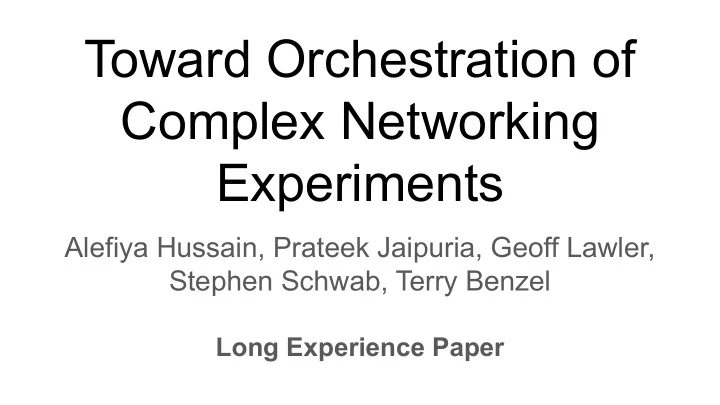

Toward Orchestration of Complex Networking Experiments Alefiya Hussain, Prateek Jaipuria, Geoff Lawler, Stephen Schwab, Terry Benzel Long Experience Paper
What is an Networking Experiment? System under Testbed test - Create meso-scale representations of the internet - Understand how the system behaves
What is an Networking Experiment? Representative Testbed Scenarios - Create meso-scale representations of the internet - Understand how the system behaves
What makes experiments complex? System under test
Complexity in networking experiments The system is mapped to different configuration
Complexity in networking experiments Each configuration is overlapped with rich set of application mixes
Complexity in networking experiments The configuration is converted to execution
Experiment Orchestration Definition: Sequence of steps required to execute the representative scenarios on the testbed Representative Testbed Sequence of Scenarios Steps
Related Work: Tools and Testbeds Shell or Ssh-based Emulab:first emulation DETER:first cyber Scripts: testbed security testbed +most popular *Tevc *SEER -limited feedback and *Experimenters * MAGI error handling workbench Ansible and other PlanetLab: first globally Emerging Testbeds: configuration distributed testbed *Fabric management Tools: *Plush *Chameleon +rich toolkit *EdgeNet -limited expressibility *MergeTB GENI: Federated collection of testbeds *ansible * Labwiki *ODEL
Experiment Orchestration in MAGI Design: agents for wide range of scenarios Execute: orchestrator and daemons Representative Testbed Sequence of Scenarios Steps
MAGI: Montage AGent Infrastructure Design: agents for wide range of scenarios Execute: orchestrator and daemons Conceptual: Specification: agent Execution:Orchestrator and Sequence of Steps activation language node daemons, agents
MAGI Specification Group : mapping of behavior roles to physical and virtual machines Agent : implementation of the behavior roles Event : a method that can be invoked in the agent Eventstreams :ordered collection of events that formulate the experiment behaviors Triggers : time- or condition based synchronization points
Specification Group : mapping of behavior roles to physical and virtual machines Agent : implementation of the behavior roles Event : a method that can be invoked in the agent Eventstreams :ordered collection of events that formulate the experiment behaviors Triggers : time- or condition based synchronization points
Specification Group : mapping of behavior roles to physical and virtual machines Agent : implementation of the behavior roles Event : a method that can be invoked in the agent Eventstreams :ordered collection of events that formulate the experiment behaviors Triggers : time- or condition based synchronization points
Specification Group : mapping of behavior roles to physical and virtual machines Agent : implementation of the behavior roles Event : a method that can be invoked in the agent Eventstreams :ordered collection of events that formulate the experiment behaviors Triggers : time- or condition based synchronization points
Specification Group : mapping of behavior roles to physical and virtual machines Agent : implementation of the behavior roles Event : a method that can be invoked in the agent Eventstreams :ordered collection of events that formulate the experiment behaviors Triggers : time- or condition based synchronization points
MAGI: Montage AGent Infrastructure Design: agents for wide range of scenarios Execute: orchestrator and daemons Conceptual: Specification: agent Execution:Orchestrator and Sequence of Steps activation language node daemons, agents
Orchestration Parser : Reads specification Scheduler : handles each eventstream concurrently, sends events to node daemons. Evaluator : receives return values from the node daemons to satisfy triggers
Daemons and Agents Daemons : lightweight control conduit Received events to launches and controls agents Returns values from agents to orchestrator for trigger evaluation Agent Modules: implementations on nodes in Python
Case Studies: Education Feedback Loops ● Development and assessment of ● Different teams interact in an multi-user text-based chat client and experiment; while limiting access to server system parts of the scenario ● 40-75 students for undergraduate ● 2000 webclients, 1000 control class, Introduction to Computer clients, 50 apache2 servers in Networks; webfarm ○ Student client with instructor server ○ Sense traffic on network ○ Random client with student server ○ Compute devise control action to ○ Upto 30 clients with student server increase, decrease or maintain traffic ○ Actuate executes control action
Case Studies: Integrated system development Cyber physical systems ● Five teams develop ● Distributed optimization control adversary-resistant communication algorithms for monitoring power flow to circumvent censorship in Tor oscillations in presence of DDoS ● Configure, deploy, manage Tor and attacks technologies ● IEEE 39 bus power system overlaid ○ Multi-scale experiments, 10 machines to on a 18 node communication 100 machines topology ○ Tor agents to start relays, bridges, and ● High volume attacks and study clients impact on damping the oscillations. ○ Large scale- 5120 client processes, microblogging, VoIP, file sharing apps
Retrospective Takeaways ● Specification is topology agnostic ○ allows direct scaling experiments ● Unordered events and with synchronization triggers ○ enables exploiting concurrency and asynchronous execution in experiment ● Error handling and logging ○ Errors and failures forwarded from nodes to orchestrator
Conclusion The MAGI tool makes it easier to run large and complex experiments on testbeds by providing a wide range of traffic agents and automating the experiment execution. MAGI is general ● runs on most testbeds ● open source Available at https://github.com/deter-project/magi Documented with examples at https://montage.deterlab.net/magi
Thank you Contact: Alefiya Hussain hussain@isi.edu
Recommend
More recommend